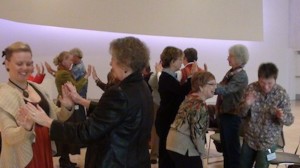What's in a name? Curation beyond collections
23 July 2012 – Meghan Gelardi Holmes

Taubman Museum education staff and docents practice theater games as a way to engage museum-goers in the exhibitions beyond the objects.
A little over six years ago, I landed my first museum job. As a newly minted assistant curator, I did what you might imagine curators do. I was responsible for a collection of objects; I conducted research on those artifacts and artworks, I brainstormed new ways of telling their stories, and I developed exhibits. Even when my work focused on online experiences, the collections remained the heart of my job. No surprise there, right? Those are the standard responsibilities of a curator.
Or at least they used to be. The word curator gets used a lot nowadays, and refers to a whole range of jobs that exist both in and outside of museums. People still curate objects, but they are as likely to be virtual as real. And curating has really expanded to mean the selection and organization of all kinds of information – online newsletters like Brain Pickings, Pinterest boards, and Etsy Treasury Lists are common examples of modern-day curatorship. In a digital age, when objects, images, and ownership are so fluid, it is much easier for the average person to cull and categorize the information they interact with on a daily basis. (Cheaper, too–curation isn’t limited to those who have disposable income to spend on antiques or art.)
The definition of curator has shifted and broadened within the museum world, too. A museum curator is as likely to be a Curator of Community Engagement or a Curator of Public Programs as a Curator of American Art or Photography. My own career path exemplifies this change perfectly. Six years after my first museum position, I’ve found myself back in an assistant curator role. Except my job couldn’t be more different: where before I focused on collections, now I am responsible for programming and education. I’m a curator of people, not objects. Instead of arranging objects and artworks so that they talk to each other within an exhibition, I plan programs that invite artists and scholars into conversation. My time isn’t spent on acquiring new items for the collection; instead, I focus on building audiences and relationships with new constituencies.
Really, this change in job titles represents a bigger change in museums themselves. Museums are moving away from collections as the primary focus of their endeavors. People, their stories, the community–these are the areas where most museums are putting their energy. Some are going even further, aiming to move their programs and activities beyond their four walls. Physical objects, even buildings, seem increasingly less central to the mission of many museums. The American Association of Museum’s TrendWatch for 2012 highlights both of these phenomena in their annual report. As it turns out, job titles might be the most concrete harbinger of the changing landscape of museum work.
~ Meghan Gelardi Holmes




Thanks for sharing your insights into your experiences with changing definitions of curatorship. In all of these cases, it seems that the notion of expertise is still alive and well. Whether you’re arranging and organizing objects or people, as a curator, you are still providing a useful and respected service. With the counterpoint conversations about crowd-sourcing and curation by the public, do you feel that there is still a strong demand for the figure in the middle designing and arranging the world around her?
Hi Adina,
Thanks for your comments. I think there is still a need – and a demand – for someone with some expertise who is helping provide perspective or curatorship in all realms. But, I think our definition of who holds that expertise, and what that expertise should or could look like, has changed drastically. So, in many settings anyway, the field is open to a lot more people than it may have been previously. What do you think?